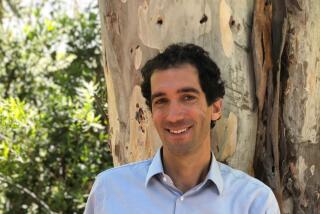What is Called Nature : THE NATURE OF NATURE and THE TREE. <i> By John Fowles (The Yolla Bolly Press: $750 slipcased, 116 pp.; $1,800, boxed) : </i>
- Share via
A new and sumptuous edition of John Fowles’ luminous essay “The Tree,” is surely a fortunate event. The publication of it that has been released recently by James and Carolyn Robertson at the Yolla Bolly Press, with woodblocks by Aeron Johnson, is limited in number, and will not reach a wide public, but its form and making do honor to the text and add to the pleasure of reading it, and any reappearance of that singular work is to be welcomed.
I have known the essay in the beautiful Little Brown edition of 1979, with its companion essay by the photographer Frank Horvat who spent six years producing the photographs of trees that appear at intervals through the volume. For years I carried that book, or the compact paperback reprint of the Fowles essay alone, by Ecco Press, with me on travels to reread, ponder, envy. There, in prose of classic gravity, precision, and delicacy, Fowles addressed matters of final importance, and his approach, his conclusions and his statement of them made such sense to me that my response was a continuing grateful recognition. His theme was the relation and the opposition between human notions of control and codification--as exemplified by his father’s neatly pruned fruit trees and the nomenclature of Linnaeus, on the one hand--and manifestations of the singular, the surprising, the wild, the imagination, the Green Man, on the other. His essay seems to me as valuable now as it did when I first read it and began urging it upon others.
The surprise of this new edition is a later essay, “The Nature of Nature,” that picks up the earlier lines of thought and continues them, some fifteen years later in Fowles’ life, after the death of his wife, a crippling illness, and a more immediate look at last things.
“The Nature of Nature” is a shorter work than “The Tree,” and it does not include vivid avocations of person and place--the author’s father, Linnaeus’ garden in Uppsale, Wistman’s Wood on Dartmoor--as the earlier essay did. But it is a work of comparable ambition, a steady, albeit unschematic, look at the tension between human evaluations of knowledge and of feeling in the setting of impending mortality.
“I am now nearly seventy, and no longer trust my brain,” Fowles begins, and it seems unlikely that his regard has ever been clearer, his assessments plainer and less prone to compromise, although he refers to his essay as “a tangled nest of memories and thoughts.” Indeed, it follows, with the sort of immediacy that Sainte-Deuve once spoke of with high admiration, his ruminations on the long, complex “border wars” as he calls them, between what we term knowledge and what we may or may not recognize and respect as feeling, and it does so with a cursive spontaneity, a startling aptness and fineness of language, and a daring that have not diminished.
Some of the things that Fowles turns to as he proceeds are, precisely, unsayable. “Illness,” he says, “has kept me even more alone than usual these last two years and brought me closer to being, though that hasn’t always been very pleasant for my body. What has struck me about the acutely rich sensation of beingness is how fleeting its apprehension...the more you would capture it, the less likely that you will...” He does not, of course, capture what cannot be captured at all, and yet he speaks for it once more with intimate authenticity. The new essay extends its predecessor. It is a testimony without pretense of plea, a mature presentation of clarity, the author’s attention drawn once again not to the labels but to the elusive, incalculable presence itself.
More to Read
Sign up for our Book Club newsletter
Get the latest news, events and more from the Los Angeles Times Book Club, and help us get L.A. reading and talking.
You may occasionally receive promotional content from the Los Angeles Times.









